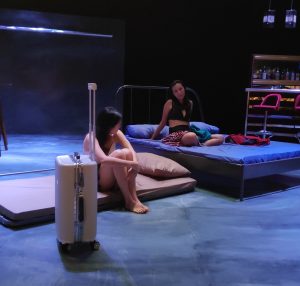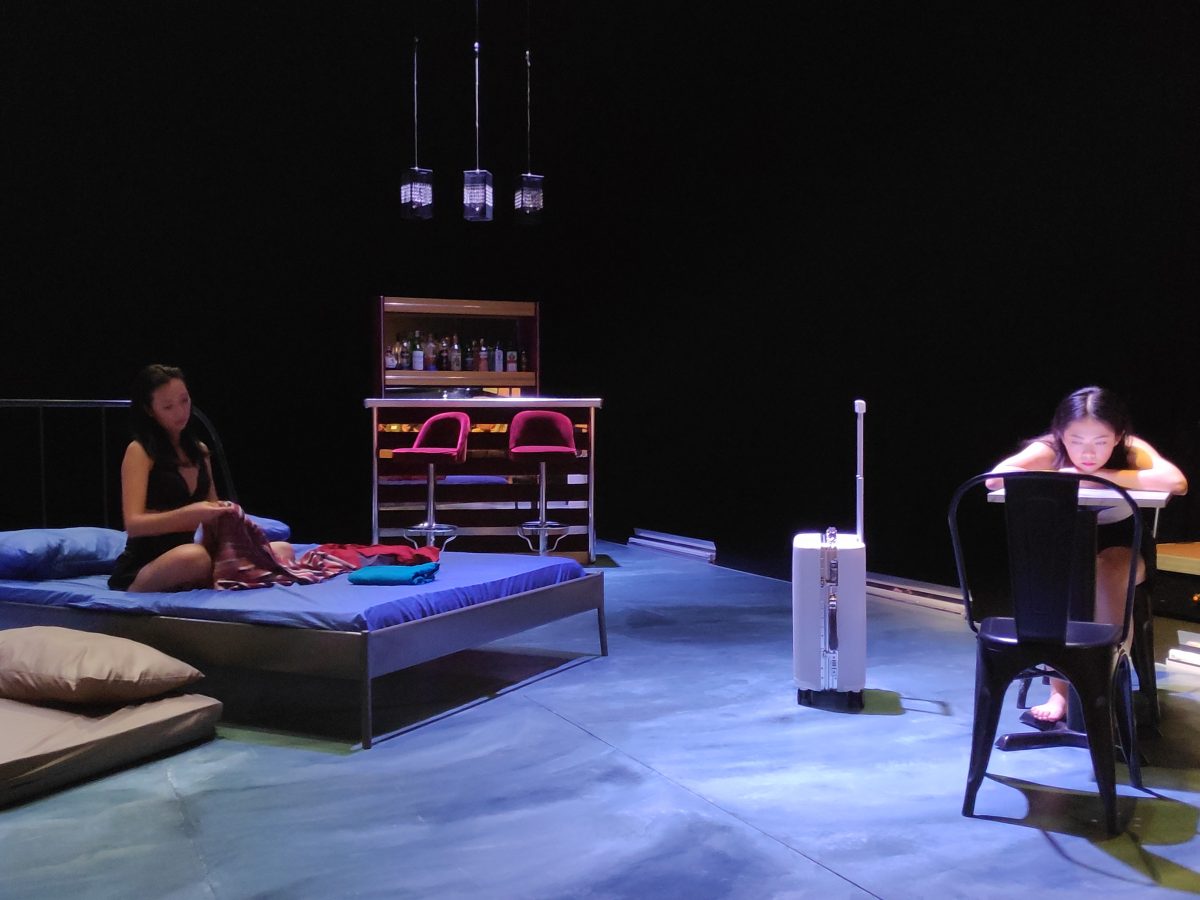The stage is set before the audience even arrives. Two women circle each other. They seem to appear in the same reality and yet, remain separate. One was sitting on a bed, stationary, as she frantically folded and refolded a man’s shirts. The other seemed lost; wandering with only a suitcase in tow. And yet, these two women had a strong connection, one that was communicated through sight, and brief, intermittent moments of interaction.
This is the opening of NUS-alum Gina Chew’s latest play ‘Permanence’, which was staged at NAFA’s Studio Theatre by Toy Factory Productions. NAFA’s studio theatre is a very intimate setting which leaves very little distance between the audience and the actors. It almost feels like we are intruding into a space that we shouldn’t be in. And it doesn’t feel right to be getting front-row seats to such intimate affairs as these women’s private lives unfold before us.
‘Permanence’ follows the protagonist Blanche, a Singaporean woman, at two distinct points in her life — her wild youth with her on-and-off bartender boyfriend, and her settled life with her seemingly ‘perfect’ husband. The play questions society’s age-old rhetoric of the ‘perfect’ life and portrays how societal expectations can have disastrous effects on a woman’s life.

The play introduces the four main characters through a provocative dance number, clad as the women are in skimpy clothing. The two Blanche’s twirl around with their respective beau’s, Chris and Nathan, and reels the audience in as one begins to wonder who these two women are and what their relationship is, and sets the themes for the play: love, sex and power.
The young Blanche, played masterfully by Chanel Ariel Chan, is a party girl that lives for the moment and despises society’s narrative of a ‘normal’ life. Her rollercoaster of a relationship with Chris, played by the equally-wonderful Jamil Shculze, lands her in a situation bereft of a boyfriend, a sense of security, and with a handful of regrets.
The play also follows an older Blanche, played by Grace Lee Khoo, who is tired of her mistakes and seeks security with her husband, Nathan, played by Terrance Tan. Khoo portrays a worn-down and world-weary Blanche effectively and Tan transitions from the loving husband to a less-than-nice one scarily convincingly.
While the play offers a realistic portrayal of the power dynamics within, and the toxicity, of some relationships without over-dramatizing it, the true brilliance of Ms. Chew’s play lies in her ability to weave the interaction between the past and the present; of memory and reality.
The stories of both the Blanche’s intermingle, but never once overshadow the other, as the present Blanche seeks refuge within the past, constantly indulging in her memories to escape the dull reality of her ‘normal’ life. This method of storytelling paints a stark contrast between both of Blanche’s relationships and allows the audience to trace the origins of Blanche’s current predicament.
The premise also allows Ms. Chew to simultaneously explore both Blanche’s situations and to inject moments of introspection — where Young and Older Blanche exist and speak to each other but Chris and Nathan are suspended in time — wherein the audience is allowed a glimpse into Blanche’s mind and her internal conflict and dialogue. and Older Blanche stare at each other, reliving the past and the inevitability of their decisions.

These moments of introspection, where the audience is removed momentarily from the narrative, allows them to relate to Blanche’s experience of her past as the constant shuffling between the past and the present mirrors our own human experience and memory. Reliving the past, questioning the wisdom of past actions, and regretting what in hindsight was a mistake, are phenomena we are all too familiar with.
Older Blanche travels through her memories as Young Blanche while dealing with the shambles that is her marriage. She revisits her fiery fling with Chris, her abortion, Chris’ abandonment, her wedding to Nathan, their fights about having kids and finally, ends up exactly where she is now: in a loveless marriage to a man who justifies marital rape with the words, “I am your husband.”
However, Ms. Chew never wrote Blanche to be a victim of her situation. She revealed, in an email interview with The Ridge, that “I really wanted to create this woman who was unapologetic, and cruel and vulnerable, and unabashed, who would do things her own way and not care what others thought. But at the same time, she’s being torn down constantly from the consequences of her actions, and societal expectations and all the things that surround us and tell us what our lives should be like.”
Blanche is as much a creator of her fate as she is the victim of societal expectations.
The show ends inconclusively and abruptly; it leaves behind the feeling reminiscent of finding the last few pages ripped out of a storybook. But the haunting imagery of the last scene — of Nathan leaning threateningly over Young Blanche as Older Blanche tries to stop him from hurting her — invites the audience to conduct their own dissection of Blanche and her future, and, as Ms. Chew put it, “between what you want to do and what you think you should do.”
More about Gina Chew, the playwright behind Permanence
Gina Chew, an NUS English Literature graduate first staged ‘Permanence’ in 2017 as part of The Wright Stuff Festival for emerging playwrights by Toy Factory Productions. She has since then revised her script and is currently re-staging it at the NAFA Studio Theatre.
Ms. Chew revealed that her inspiration for Permanence came “from a collection of memories, experiences, things I’ve heard from others, things I’ve been told…it came about really like any story comes about, from a need to tell the world something that is tugging at you.”
However, she credits her foray into playwriting to Faith Ng’s—an NUS lecturer and the playwright behind numerous acclaimed plays such as “Wo(men)” and “For Better Or For Worse”—playwriting module in NUS, calling it “the best possible place for me to start out as a playwright. It was exactly as advertised—a very safe space to find out what kind of writer you are.” In fact, she revealed that “Permanence was first conceived in the module actually.”
She is also very enthusiastic about the NUS arts scene and said that, “the best part about the NUS art scene is getting to mingle with people who are passionate about something as well—forming that kind of community is important, especially since writing for the most part is a lonely, vulnerable affair.”
But lonely and vulnerable as it may be, she left a few words of advice for those of you aspiring playwrights and writers out there. And for once these words are more practical than idealistic, which is sure to be a comfort to those who have heard the same old rhetoric before:
“Don’t stop trying to tell the story that you’re nuts about. But also, if I’m being honest, it helped me personally to have a day job because I get worried about things like that and I need financial security. I’ve found that having a safety net actually helped me to make better choices and be more considerate to my art and my process. It lets me take more risks because I can…literally, afford to.”
Any other plays that you want The Ridge to review? Let us know at theridgeteam@nussu.org.sg


